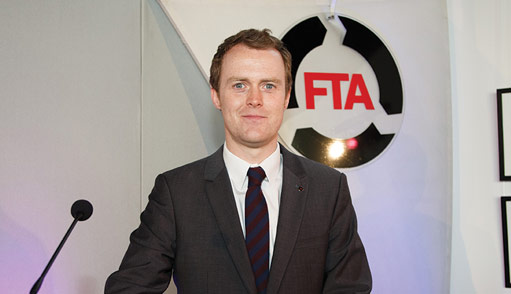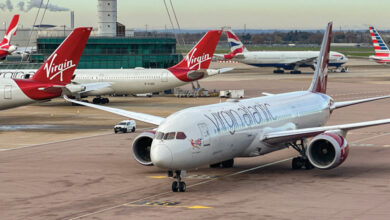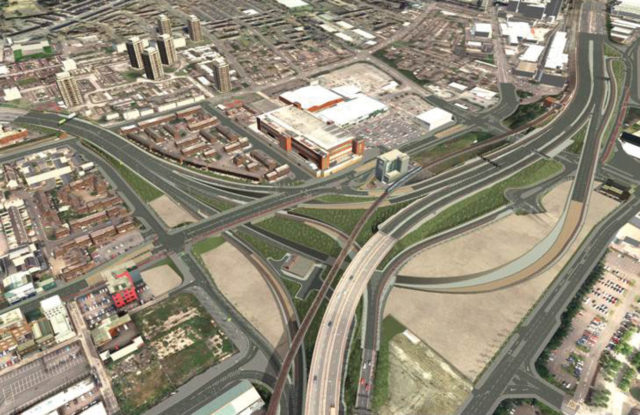Hard Brexit: Diversion in place
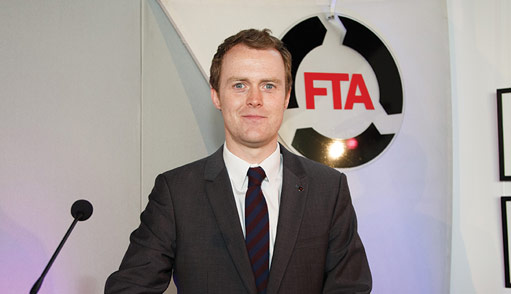
Freight Transport Association’s Policy and Membership Manager for Northern Ireland, Seamus Leheny, talks to David Whelan about the detrimental logistics of a hard Brexit and the lengths they are going to ensure that Ireland’s border remains porous.
Like many industries, Seamus Leheny surmises that the greatest impact of the Brexit referendum on FTA members currently lies in the uncertainty. However, he is clear that while access to the Single Market is important, the majority of concerns surround access to the Republic of Ireland market.
He estimates that well over half of the FTA’s Northern Ireland membership operate regularly across the border and is assertive that any return to border controls would be unfeasible for most businesses.
Even prior to Article 50 being triggered, the freight and transport sector in Northern Ireland is already fire-fighting the referendum decision. One obvious area he points to is that of fuel costs. It is estimated that fuel makes up 30 per cent of the running costs of an average 44 tonne lorry, equating to around £45,000 per year. Previously, companies who work cross-border have been able to take advantage of the 14p per litre differential in fuel duty between Ireland and the UK, while also taking advantage of a strong sterling against the euro. “That gap is closing now,” Leheny explains, “The Republic of Ireland still has a lower fuel duty but the narrowing exchange rate means that many companies are losing out on what previously was seen as a competitive edge and an ability save costs.”
During the Brexit campaign, the FTA opted to assume a neutral stance, instead choosing to act as an information provider and delivering factual analysis. Leheny explains that the role has now shifted somewhat to acting as a leading voice for the industry in ensuring that the difficult and unique situation that their members find themselves is recognised during any negotiations.
“I believe we have had a fair degree in success in this role,” Leheny states, as he explains that he has been liaising with the Department of Transport (DfT) in London, the Northern Ireland Office and a range of political figures. He points to a meeting in January between a delegation of six of Northern Ireland’s largest businesses, working cross-border, with four senior civil servants from DfT and the Department for Business, Energy and Industrial Strategy tasked with co-ordinating Brexit, organised by the FTA at the request of the Department, as a positive sign.
“This gives us some hope that DfT and other key Brexit decision makers realise Northern Ireland’s unique situation and are willing to engage with vehicle operators.”
Hard Brexit
Comments by British Prime Minister Theresa May in early January that the UK would not be able to keep “bits” of its membership have been taken by many as the strongest indication that there is to be a hard Brexit.
“For the UK Government to comply with the wishes of its electorate it’s only plausible that they leave the Customs Union. However, leaving the Customs Union means that the Irish border becomes an international frontier and that will be the case unless the EU agrees or decides to make the island of Ireland a special case. The concern here is that there are 27 member states, some of whom would also like to see special status, the likes of Greece and Bulgaria and Poland and Belarus with their non EU neighbours, as favourable to them. The EU are going to be very mindful of protecting their own interests first.”
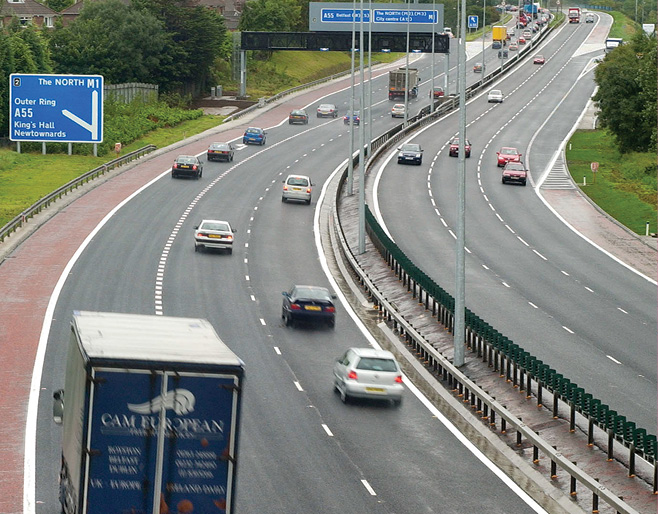
“In Ireland we have around 200 roads connecting north and south, not every road could be designated.”
Speaking about the implications of custom controls being set up on the Irish border for FTA members, Leheny says that he has already had feedback from a number of companies who would opt to move their distribution centre into the Republic. He adds: “As well as those indigenous companies working cross-border, a lot of UK retailers treat Ireland on an all-island basis. Considering that the majority of their stores will lie in the Republic of Ireland, any disruption would mean it would make sense to ship direct to Dublin and distribute from there. That would have a big impact on jobs in the areas of distribution and warehousing in Northern Ireland.”
Discussing the unfeasibility of physical border checks, Leheny highlights the TIR Carnet document used for transporting goods to areas outside the EU such as Turkey, Russia and Ukraine, which costs over £50 and requires around six to 10 weeks approval time. “That’s a worst case scenario but the implications for companies who move stuff from Newry to Dundalk daily or those companies selling products directly into Donegal, for example, are unthinkable. Any increase in red tape and documentation would likely lead to already stretched companies having to increase their administrative duties. That’s why we have been keen to stress to those in Whitehall that people work, socialise and trade across the Irish border.”
Leheny has assessed the border between Norway and Sweden, which is often touted as an example for Ireland to follow, where there are 14 designated roads for freight carriers and the average delay is estimated at 10 minutes for those facing no inspection and 30 minutes for those who are selected. “In Ireland we have around 200 roads connecting north and south, not every road could be designated and then we face the problem of our infrastructure lagging way behind that of Sweden and Norway, potentially extending any delay. The real time impact of that is that a driver might have a 15 minute window in which to deliver at a busy warehouse, missing that slot could see them parked up for five hours until another one becomes available and that is costly for everyone involved.”
Infrastructure
Leheny is resolute in his stance that Northern Ireland is suffering from a connectivity imbalance in terms of ports, roads and air freight and must at the very least secure EU-level funding from Westminster. He is sceptical as to whether Northern Ireland’s ports are big enough or well-equipped to make use of any potential trade deals set up further than Europe and raises the potential of tariffs when using current trans-shipment ports such as Rotterdam as a launch port for any trade with North America.

“The Republic of Ireland became masters of acquiring EU funding to build a road network and Northern Ireland seriously lagged behind on this.”
With the majority of Northern Ireland’s exports and imports travelling via road, any restrictions on travel, including the on-going repatriation of the UK border to Kent from Calais argument, would have a knock on effect for Northern Ireland’s trade, where high value and fresh good exports make up an extensive portion of the economy.
“That’s why we are so reliant on the UK government to make sure our gateway to the EU remains clear for our road freight,” he states.
Leheny sees any potential loss to Ten-T EU funding as a “massive blow” for ambitions to upgrade Northern Ireland’s road system. Pointing to the recently completed A8 to Larne and plans for the York Street Interchange as examples of how beneficial EU funding can be, he is equally hopeful and sceptical about the Executive’s ability to secure replacement funding from Westminster for those projects deemed eligible for EU Ten-T funding such as the Newry Southern Relief Road, the A1 dual carriageway from Newry to Sprucefield and the Sprucefield bypass connecting the A1 and M1.
“It’s no secret that the Republic of Ireland became masters of acquiring EU funding to build a road network and Northern Ireland seriously lagged behind on this. Our connectivity is holding us back in sea, air and road freight. If an investor, whose priority is to get goods to market quickly and cheaply, is looking between Belfast and Dublin, then Dublin is currently streets ahead.”
Speaking just days after former deputy First Minister Martin McGuinness tendered his resignation, Leheny says that initial positive signs from the new Department for Infrastructure were now potentially in jeopardy. “The biggest impact for us is the lack of a budget until potentially August, which will likely delay the progress of any infrastructure projects. The Department’s strategy put a priority in redressing the imbalance in the West, these were projects that weren’t eligible for EU funding support and it was hoped that within the budget we would see further funding for further crucial road improvements.
“However, we are now in limbo. With the potential of an election comes the potential of a new Minister. Their priorities may be different from those of Chris Hazzard. Going back to the drawing board would put us back years in terms of our road infrastructure, infrastructure that is already decades behind that of the Republic of Ireland.”
Migration
Any restrictions imposed on foreign nationals would also have a major impact on the sector, which Leheny points out is suffering from a shortage of freight drivers. Currently over one third of HGV drivers are over the age of 50, while just two per cent are under the age of 25. As well as a reliance on Eastern European drivers and drivers from the Republic of Ireland, EU nationals are also a vital source of labour within warehousing, were they make up 23 per cent of total staff.
“Across all sectors we are seeing a social change and a change in the dynamic of family life that maybe was not as evident 10 years ago. Many people no longer want to be away from home for long-periods and work the unsocial hours that our industry often requires. What we are seeing is that a lot of the EU work and even cross-channel work is being fulfilled by Eastern European drivers. Access to that skills market is very important to many of our members.”
Even when assessing any potential opportunities, Leheny believes that any optimism is made up of “ifs and buts”. “A potential advantage lies in those trade deals that are yet to be struck with areas such as North America but in order for that to be beneficial we would have to build on rather than replace our current EU levels and for those deals to be done quickly.”

